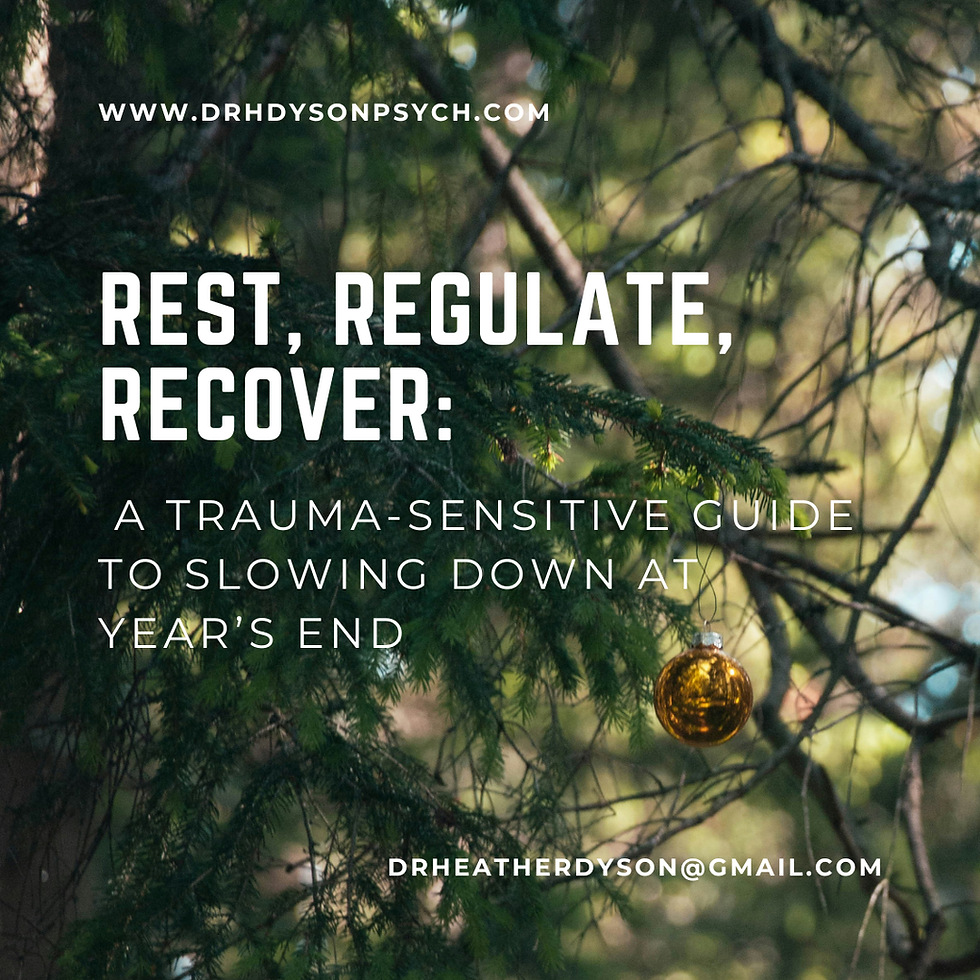The Science of Self-Compassion: Strategies for Building a Kinder Relationship with Yourself
- Dr Heather Dyson

- Jun 20, 2023
- 3 min read
Updated: Jun 26, 2023

In a fast-paced and often demanding world, we often forget to be kind to ourselves. We strive for perfection, criticise our flaws, and push ourselves relentlessly. However, cultivating self-compassion is essential for our overall well-being and mental health. Fortunately, the science of self-compassion offers us strategies to develop a kinder relationship with ourselves. By understanding the benefits and implementing these strategies, we can foster self-compassion and lead more fulfilling lives.
Understanding Self-Compassion Self-compassion is the practice of treating oneself with kindness, understanding, and empathy. It involves recognising our own suffering and responding to it with compassion, just as we would for a loved one. Dr. Kristin Neff, a pioneer in the field, defines self-compassion as having three core components: self-kindness, common humanity, and mindfulness.
Self-kindness entails being understanding and gentle with ourselves when facing challenges or making mistakes. It means embracing our imperfections and responding with care and support, rather than self-criticism. Common humanity reminds us that suffering and setbacks are a natural part of the human experience. By acknowledging that we are not alone in our struggles, we can cultivate a sense of connectedness and empathy. Mindfulness involves being present in the moment, without judgment, and accepting our emotions and experiences with an open heart.
The Benefits of Self-Compassion Numerous studies have demonstrated the positive impact of self-compassion on our mental, emotional, and physical well-being. Research suggests that practicing self-compassion can reduce anxiety, depression, and stress levels. It also enhances resilience, self-esteem, and overall life satisfaction. Additionally, self-compassion is associated with improved emotional intelligence, healthier relationships, and increased motivation to pursue personal growth and well-being.
Strategies for Building Self-Compassion
1. Cultivate Self-Awareness: Begin by developing an understanding of your self-critical thoughts and judgments. Notice when you are being harsh or unforgiving toward yourself and challenge these negative beliefs. Self-awareness is a crucial first step toward practicing self-compassion.
2. Practice Mindfulness: Incorporate mindfulness into your daily life by engaging in meditation, deep breathing exercises, or simply taking moments to pause and observe your thoughts and emotions without judgment. Mindfulness allows you to develop a compassionate and non-reactive stance toward your experiences. It helps you create space for self-compassion to grow.
3. Challenge Self-Criticism: Replace self-critical thoughts with self-compassionate ones. Treat yourself as you would a close friend who is struggling. Encourage and support yourself, emphasising understanding and kindness rather than judgment. Challenge the unrealistic expectations and high standards you may have set for yourself.
4. Embrace Imperfections: Recognise that perfection is an unattainable goal and that making mistakes is a part of being human. Embrace your imperfections, viewing them as opportunities for growth and learning. Remember, self-compassion thrives when we accept ourselves, flaws and all. Embracing imperfections allows us to foster self-acceptance and compassion toward ourselves.
5. Practice Self-Care: Prioritise self-care activities that nourish your mind, body, and soul. This can include engaging in hobbies, getting sufficient rest, eating nutritious foods, exercising, and seeking social connections. Engaging in activities that bring you joy and fulfilment fosters self-compassion. Remember to treat yourself with kindness and prioritise your well-being.
6. Seek Support: Reach out to supportive friends, family members, or professionals when needed. Share your struggles, fears, and vulnerabilities with trusted individuals who can provide empathy and understanding. Surrounding yourself with a supportive network strengthens self-compassion. Sometimes, seeking professional help through therapy can provide valuable guidance in developing self-compassion.
Building a kinder relationship with ourselves through self-compassion is a transformative journey. It requires a shift in mindset, embracing self-kindness, and acknowledging our shared humanity. The science of self-compassion provides us with evidence-based strategies to cultivate self-compassion and lead happier, healthier lives.
By practicing self-awareness, mindfulness, and challenging self-criticism, we can begin to shift our inner dialogue toward kindness and understanding. Embracing imperfections and prioritising self-care allow us to nurture our well-being and develop self-compassion. And seeking support from our loved ones or professionals can offer guidance and encouragement along the way.
Remember, self-compassion is not about being self-indulgent or letting ourselves off the hook when it comes to personal growth. It's about treating ourselves with the same care and compassion we would extend to others, acknowledging that we are all imperfect beings navigating the complexities of life. By embracing self-compassion, we can build a solid foundation of self-love, resilience, and inner peace.
#compassion #selfcare #mentalhealth #mh #psychology #trauma #psychologist #traumaspecialist #therapy #support
Photo by Nicolas Lobos on Unsplash




Comments